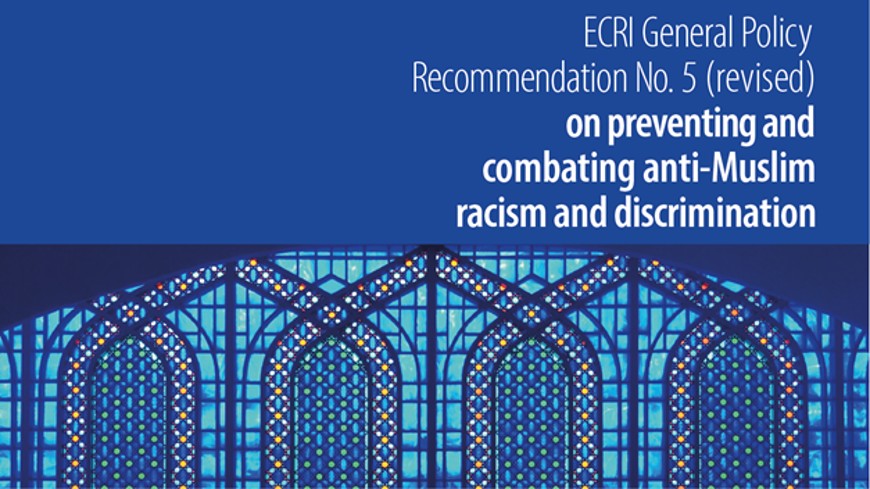On 1 March 2022, , the European Commission against Racism and Intolerance (ECRI) published a revised General Policy Recommendation on preventing and combating anti-Muslim racism and discrimination to help prevent and counter increasing public manifestations of anti-Muslim racism and discrimination across Europe. In its new Recommendation, ECRI underlined that Muslims are part and parcel of Europe’s diversity, to which they have contributed for centuries, and recalled that collective action was needed to build inclusive societies that bring communities and individuals closer together and ensure equal dignity and mutual respect through shared democratic values. ECRI noted with concern in recent years that anti-Muslim hatred and prejudice have often been prevalent in society, dispersing across institutional, political, social and economic life. In addition, anti-Muslim racism is not always reducible to hostility to a “religion” alone and is intimately linked to other forms of exclusion, which can overlap with anti-immigrant sentiments, xenophobia, gender or social class bias. In other words, anti-Muslim racism is multi-layered and intersectional. In many instances, refugees, asylum seekers and migrants (from Muslim majority countries) have been viewed as “Muslims” since the latter are often not only defined in terms of their religious affiliation but also in terms of their presumed ethnic or national background. ECRI therefore decided to provide comprehensive guidance to governments on how to address anti-Muslim racism and discrimination in four specific areas: i) policies and institutional coordination, ii) prevention, iii) protection, and iv) prosecution and law enforcement.
On 3 March 2022, ECRI published its conclusions on the implementation of its priority recommendations addressed to the Netherlands in 2019 concerning discrimination in the field of integration and labour market. ECRI recommended that the authorities of the Netherlands adopt an integration strategy and action plan supporting and promoting integration of people with migration backgrounds and Antilleans. Furthermore, ECRI recommended that the authorities ensure the provision of free language and integration courses from the first moment and offer the possibility to adapt integration programmes to the individual needs and capacities of people with migration backgrounds and Antilleans. However, while welcoming some positive features of the Civil Integration Act since 1 January 2022, ECRI remained concerned about what is considered a "punitive approach" taken by the Dutch authorities to integration. More specifically, all asylum-seekers registered before 2022 and most non-EU migrants are still obliged to pay for integration courses themselves while facing a relatively hefty fine in case of failure to pass a final integration exam within three years. ECRI, therefore, concluded that its recommendation had not yet been implemented. The second priority recommendation was for the authorities to insert indicators and measurable targets for the 2018-2021 Action Plan against Labour Market Discrimination, focusing on access to the labour market, ensuring non-discriminatory recruitment procedures, and extending the competencies of the labour inspectorates to the field of recruitment. However, ECRI noted that neither indicators nor measurable targets were inserted into the action plan and that new legislative and other measures against discrimination in the labour market had not been adopted. Therefore, this recommendation had not yet been implemented either, ECRI concluded.
From 29 March to 1 April 2022, at its 88th plenary meeting, ECRI debated the consequences of the Russian Federation's aggression against Ukraine, and adopted a statement expressing its solidarity with the millions of Ukrainian people in despair and mortal danger who are forced to flee or take refuge within and outside Ukraine. Furthermore, ECRI commended the authorities, equality bodies, and civil society actors of the Council of Europe member states for offering protection to people fleeing from Ukraine by helping them ensure access to their rights, such as their rights to health care, social welfare, and housing, education and employment. ECRI trusts that an effective investigation will be conducted into reports of unjustified differential treatment of Roma and people of African or Asian descent coming from Ukraine and that there will be no discrimination against anyone in need of protection and assistance.



